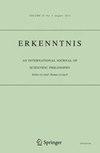信息和解释性。
IF 0.8
2区 哲学
0 PHILOSOPHY
引用次数: 0
摘要
我提出了一种定性的贝叶斯解释,它类似于贝叶斯增量确认的解释。这是通过复杂性标准来实现的,根据该标准,如果h带来的解释e的复杂性降低(解释增益)大于h在e的上下文中引入的额外复杂性(解释成本),则解释h是好的。为了说明这一说法,我将其应用于特定假设的背景中。本文章由计算机程序翻译,如有差异,请以英文原文为准。
Information and Explanatory Goodness.
I propose a qualitative Bayesian account of explanatory goodness that is analogous to the Bayesian account of incremental confirmation. This is achieved by means of a complexity criterion according to which an explanation h is good if the reduction in the complexity of the explanandum e brought about by h (the explanatory gain) is greater than the additional complexity introduced by h in the context of e (the explanatory cost). To illustrate the account, I apply it in the context of ad hoc hypotheses.
求助全文
通过发布文献求助,成功后即可免费获取论文全文。
去求助
来源期刊

ERKENNTNIS
PHILOSOPHY-
CiteScore
2.10
自引率
11.10%
发文量
116
期刊介绍:
Erkenntnis is a philosophical journal publishing papers committed in one way or another to the philosophical attitude which is signified by the label ''scientific philosophy''. It concentrates on those philosophical fields which are particularly inspired by this attitude, although other topics are welcome as well. These fields are:- Epistemology - Philosophy of science, foundations and methodology of science in general and of natural and human sciences such as physics, biology, psychology, economics, social sciences in particular - Philosophy of mathematics - Logic, philosophy of logic, and all kinds of philosophical logics - Philosophy of language - Ontology, metaphysics, theory of modality - Philosophical psychology, philosophy of mind, neurophilosophy - Practical philosophy, i.e. ethics, philosophy of action, philosophy of law, etc. One of the objectives of Erkenntnis is the provision of a suitable platform for the discussion of controversial issues; another is the provision of timely, competent reviews of important publications in an ever-growing field of research.In recent years, philosophers standing quite outside the pale of analytic philosophy have also paid careful, and indeed most welcome, attention to precision of concept and language, to arguments, and to well-grounded foundations. Erkenntnis provides for them, and for philosophers of all persuasions, a place of meeting, of discussion, and of disputation.Erkenntnis was originally founded in 1930 by Rudolf Carnap and Hans Reichenbach, it was revived in 1975 by Carl G. Hempel, Wolfang Stegmüller, and Wilhelm K. Essler. You can find more information about this in the article “Hempel: The old and the new ‘Erkenntnis’” accessible in the tabs to the right.Today, Erkenntnis is one of the leading journals in philosophy worldwide and attracts first-class authors at all stages of career; from young philosophers at the PhD level up to established academic philosophers and highly renowned senior scholars. We pride ourselves on supplying our authors with substantial referee reports, subject to a turnaround time of about three months until the first decision. The acceptance rate for publications in the journal is presently slightly below 10%.
 求助内容:
求助内容: 应助结果提醒方式:
应助结果提醒方式:


